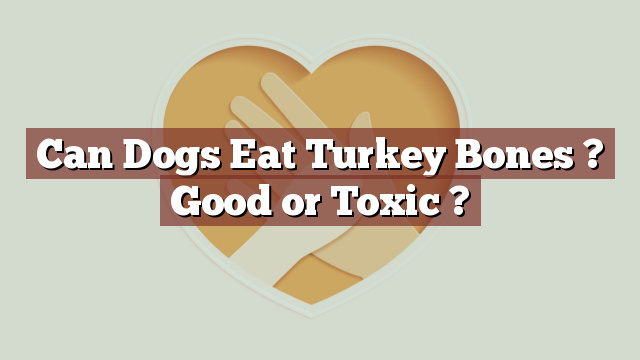Can Dogs Eat Turkey Bones? Good or Toxic?
Can dogs eat turkey bones? This is a common question among pet owners who want to ensure the well-being of their furry friends. It is crucial to be aware of which foods are safe for dogs and which ones can be harmful. In this article, we will explore the nutritional value of turkey bones and the potential hazards they pose to dogs. We will also discuss the steps to take if your dog has ingested turkey bones.
Nutritional Value of Turkey Bones: What Do They Offer?
Turkey bones, like many other animal bones, contain essential nutrients that can benefit our canine companions. They are a rich source of calcium, phosphorus, and trace minerals. These minerals are crucial for the development and maintenance of healthy bones, teeth, and overall skeletal structure in dogs. Additionally, the chewing action required to consume bones promotes dental health by reducing plaque and tartar buildup.
Can Dogs Eat Turkey Bones? Hazards and Safety Concerns
No, dogs should not eat turkey bones. Despite their nutritional benefits, turkey bones pose significant hazards to dogs. When cooked, turkey bones become brittle and can splinter easily. These sharp splinters can cause severe injuries to a dog’s mouth, throat, and gastrointestinal tract. The sharp edges of the bones can lacerate the soft tissues, leading to internal bleeding, punctures, or intestinal blockages. In some cases, these injuries can be life-threatening and require immediate veterinary intervention.
Furthermore, turkey bones can also pose a choking hazard to dogs. If a bone gets lodged in the dog’s throat, it can obstruct their airway, leading to breathing difficulties or even suffocation. Therefore, it is essential to keep turkey bones and other cooked bones out of reach from our canine companions.
Potential Risks or Benefits: Weighing the Pros and Cons
While there may be some nutritional value in turkey bones, the potential risks far outweigh any benefits. The hazards associated with turkey bones, such as splintering, lacerations, and choking, make them an unsafe choice for dogs. It is important to consider the well-being of our pets and prioritize their safety over any potential nutritional benefits.
My Dog Ate Turkey Bones: Steps to Take for Their Health
If your dog has ingested turkey bones, it is crucial to take immediate action. Contact your veterinarian right away for guidance tailored to your specific situation. Based on the size of your dog, the amount and type of bones eaten, and the symptoms observed, the vet may recommend various steps, including inducing vomiting, monitoring your dog’s condition, or conducting diagnostic tests to ensure there are no internal injuries or blockages.
Never attempt to induce vomiting or administer any home remedies without professional advice, as this can sometimes worsen the situation. Prompt veterinary care is essential to minimize the potential risks associated with turkey bone ingestion.
Conclusion: Being Cautious and Making Informed Decisions
In conclusion, dogs should not eat turkey bones due to the hazards they present. While they do offer some nutritional value, the risks of splintering, lacerations, and choking outweigh any potential benefits. As responsible pet owners, it is our duty to make informed decisions about the foods we offer our canine companions. Always consult with your veterinarian regarding the safety of any food before feeding it to your dog. By being cautious and prioritizing their well-being, we can ensure a happy and healthy life for our furry friends.
Thank you for investing your time in exploring [page_title] on Can-Eat.org. Our goal is to provide readers like you with thorough and reliable information about various dietary topics. Each article, including [page_title], stems from diligent research and a passion for understanding the nuances of our food choices. We believe that knowledge is a vital step towards making informed and healthy decisions. However, while "[page_title]" sheds light on its specific topic, it's crucial to remember that everyone's body reacts differently to foods and dietary changes. What might be beneficial for one person could have different effects on another. Before you consider integrating suggestions or insights from "[page_title]" into your diet, it's always wise to consult with a nutritionist or healthcare professional. Their specialized knowledge ensures that you're making choices best suited to your individual health needs. As you navigate [page_title], be mindful of potential allergies, intolerances, or unique dietary requirements you may have. No singular article can capture the vast diversity of human health, and individualized guidance is invaluable. The content provided in [page_title] serves as a general guide. It is not, by any means, a substitute for personalized medical or nutritional advice. Your health should always be the top priority, and professional guidance is the best path forward. In your journey towards a balanced and nutritious lifestyle, we hope that [page_title] serves as a helpful stepping stone. Remember, informed decisions lead to healthier outcomes. Thank you for trusting Can-Eat.org. Continue exploring, learning, and prioritizing your health. Cheers to a well-informed and healthier future!

